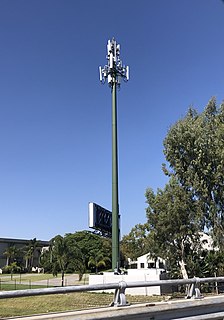Related Research Articles
Brazil has both modern technologies in the center-south portion, counting with LTE, 3G HSPA, DSL ISDB based Digital TV. Other areas of the country, particularly the North and Northeast regions, lack even basic analog PSTN telephone lines. This is a problem that the government is trying to solve by linking the liberation of new technologies such as WiMax and FTTH) only tied with compromises on extension of the service to less populated regions.
Telecommunications in France are highly developed. France is served by an extensive system of automatic telephone exchanges connected by modern networks of fiber-optic cable, coaxial cable, microwave radio relay, and a domestic satellite system; cellular telephone service is widely available, expanding rapidly, and includes roaming service to foreign countries.
Telecommunications in Ireland operate in a regulated competitive market that provides customers with a wide array of advanced digital services. This article explores Ireland's telecommunications infrastructure including: fixed and mobile networks, The voice, data and Internet services, cable television, developments in next generation networks and broadcast networks for radio and television.
Telecommunications in New Zealand are fairly typical for an industrialised country.

Censorship and the issue of media freedom in Russia have been main themes since the era of the telegraph. Radio was a major new technology in the 1920s, when the Communists had recently come to power. Soviet authorities realized that the "ham" operator was highly individualistic and encouraged private initiative – too much so for the totalitarian regime. Criminal penalties were imposed but the working solution was to avoid broadcasting over the air. Instead radio programs were transmitted by copper wire, using a hub and spoke system, to loudspeakers in approved listening stations, such as the "Red" corner of a factory. Due to the enormous size of the country Russia today leads in the number of TV broadcast stations and repeaters. There were few channels in the Soviet time, but in the past two decades many new state-run and private-owned radio stations and TV channels appeared.

Telecommunications infrastructure in South Africa provides modern and efficient service to urban areas, including cellular and internet services. The Independent Communications Authority of South Africa (ICASA) is the watchdog of the telecommunications in the country.
Telecommunications in the United Kingdom have evolved from the early days of the telegraph to modern broadband and mobile phone networks with Internet services.
Portugal has a modern and flexible telecommunications market and a wide range of varied media organisations. The regulatory body overseeing communications is called ANACOM.

Telecommunications in Armenia involves the availability and use of electronic devices and services, such as the telephone, television, radio or computer, for the purpose of communication. The various telecommunications systems found and used in Armenia includes radio, television, fixed and mobile telephones, and the internet.
This article concerns the systems of telecommunication in Austria. Austria has a highly developed and efficient telephone network, and has a number of radio and television broadcast stations.
Telecommunications in Bahrain are provided by the Bahrain Telecommunications Company, trading as Batelco, as well as other companies such as Zain and Stc Bahrain.

T-Mobile is the brand name used by some of the mobile communications subsidiaries of the German telecommunications company Deutsche Telekom AG in the Czech Republic, Poland, the United States and by the former subsidiary in the Netherlands.

KPN is a Dutch landline and mobile telecommunications company. KPN originated from a government-run postal, telegraph and telephone service and is based in Rotterdam, Netherlands.

Telekom Malaysia Berhad (TM) is a Malaysian telecommunications company founded in 1984. Beginning as the national telecommunications company for fixed line, radio and television broadcasting services, it has evolved to become the country's largest provider of broadband services, data, fixed-line, pay television and network services. TM ventured into the Long Term Evolution (LTE) space with the launch of TMgo, its first 4G offering. TM's 850 MHz service was rebranded as unifi Mobile in January 2018.
Vodafone Kabel Deutschland GmbH is the largest cable television operator in Germany. Kabel Deutschland was subject to a hostile takeover bid by the British Vodafone Group in September 2013; the deal was approved in December 2013 and finalised on 29 January 2014. Until the takeover the company name was Kabel Deutschland.
The prevalent means of connecting to the Internet in Germany is DSL, introduced by Deutsche Telekom in 1999. Other technologies such as Cable, FTTH and FTTB (fiber), Satellite, UMTS/HSDPA (mobile) and LTE are available as alternatives.
Vodafone GmbH is a mobile telecommunications operator in Germany headquartered in Düsseldorf. It provides mobile phone, LTE, 5G, cable internet, landlines, cable TV, and IPTV services. As of the third quarter of 2021, Vodafone GmbH has more than 31 million mobile customers in Germany, making it the third-largest provider of mobile phone services in Germany. The company's headquarters are in the suburb of Heerdt in Düsseldorf, with regional offices throughout Germany. Vodafone Germany's main competitors are Telekom Deutschland and Telefónica Germany.
Telecommunications in Hungary include radio, television, fixed and mobile telephones, and the Internet.

1&1 AG is a German telecommunications service provider headquartered in Maintal and listed on the TecDAX. Since 2017, the majority of the company has belonged to United Internet, and offers both mobile and landline services.
References
- ↑ Deutsche Telekom fibre plans?, Aug 26 2011, Advanced Television
- ↑ Deutsche Telekom first to deploy LTE in digital dividend spectrum, 22 October 2010
- ↑ Vodafone starting LTE city rollout, 29 June 2011, published in Telegrography